- Home
- Heather Graham
Knight Triumphant Page 5
Knight Triumphant Read online
Page 5
Still amazed, Igrainia followed the priest into the hall. “Where are we going?”
“Sir Robert Neville tosses in a fever, but he has asked to see you. It may well be a last request, and so Sir Eric has said you may have a minute.”
They hurried down the hall to Robert’s chamber. Igrainia swept in, alarmed to see how seriously ill Robert had grown in such a short time. She immediately took the water by the bed and began bathing his face. Robert was a handsome man, her husband’s second cousin. He was gifted with sable brown hair and deep, haunting eyes. His features were very fine, as Afton’s had been, and usually, when he stood, he was lean and straight, and he both rode and fought with courage and skill.
Now his face was pale, and his eyes seemed like stygian pools. He caught her hand as she cooled his face.
“Igrainia!”
“Robert, rest.”
“You’re alive, safe . . .”
“Aye, Robert. I’m well.”
“They have the castle. The outlaws, the barbarians . . . you must find a way to leave.”
“Aye, Robert, don’t worry.” She glanced at Father MacKinley; they both knew she’d be forgiven any lie. “Don’t worry. I will get away. They pay little heed to me.”
He almost seemed to have forgotten her.
“It should have been mine now. It shouldn’t have fallen. . . to this. To them. King Edward should have bestowed the castle on me. Now . . . it is death, they are death. You mustn’t worry. I was Afton’s kinsman, I will take the castle again, I will see that you are safe . . . that you are safe with me.”
“Aye, Robert, don’t worry. You must save your strength. I’m brewing herbs in warm wine, and you will drink it and sleep and fight this illness. We’ll survive, we’ll both survive, and the castle will be ours again.”
He still held her hand, but he had no power. She slipped free from his grasp, slipping his arm back beneath the sheets. When she looked up, she saw that Eric Graham had come to the door and was watching her. She didn’t know what he had heard.
“You must come,” he said simply.
She nodded. Robert Neville’s eyes had closed; he wasn’t dead, she saw with relief, only sleeping. She hurried to the Scotsman, and walked back across the hall again.
Margot was tossing again, burning with heat. Igrainia immediately began bathing her with cool cloths, harnessing the rampaging fever.
Eric imitated her every action. At last, the fever somewhat abated. It appeared that Margot slept in some peace once again.
The Scotsman continued to pace, then paused by the mantel at last, staring into the fire.
Igrainia sank into the chair by her bedside, watching Margot.
She kept that vigil through the night.
When morning came, she stretched, having fallen into a doze in the chair. The woman still breathed.
The Scotsman was still standing by the fire. She doubted that he had taken a minute’s sleep, all through the night.
Igrainia touched Margot’s lips gently, then rose and told Eric, “She is still with us. I need more kindling for the fire. And now, we must get some more plain, cool water past her lips. If you would help me here . . . please.”
He turned away from the mantel where he had leaned. His color had gone from the ruddy glow of health to the pale ash of illness.
“Tell me what I must do.”
His voice rasped. It seemed he would walk to her, but could not manage to make his legs move.
Igrainia gasped, staring at him, then walked instinctively his way.
“You are about to—”
Even as she neared him, the great power of the man gave way, and his imperious length of muscle, sinew and strength went crashing to the floor.
She came to a halt, wincing.
Then she froze, waiting to see if he would move.
He did not.
She came to her knees at his side. His eyes were closed. They opened briefly, a deep, dark blue. He moved his lips to speak but no sound came. He reached out. His long fingers fell short of touching her face. His eyes closed once again.
Igrainia hesitated, then laid her fingers against the ashen flesh of his face.
His flesh burned with a heat like the fires of hell.
He wielded no power over any man then.
CHAPTER 3
He could hear his wife’s voice.
Her tone crystalline and soft, a whisper that came to him, brushing his ear. She moved about him, telling him that he must drink, sip cool water. He seemed to live the days when the sea breezes were strong against him and the world was shaded in the blue of the sky and the kiss of the cool air. Then there was darkness. He would waken, and think again that she was near, and that he could feel the silken brush of her hair against his flesh.
There were times when he knew that his wife was dead. No woman, no witch, no healer, could have brought her back, just as his babe was gone. His child, who had been everything tender and sweet in a world of steel and blood. She had been a shimmering ray of innocence, so small. She came to him in his dreams, fingers curled in those of her mother, and they walked to him together, beckoning, and he would follow. He heard his daughter’s melodic laughter, and the music of Margot’s voice as she so gently chastised and taught. There had been such wonder in holding Aileen when she came into the world, his hands so big and calloused against the purity of her flesh. He seemed to live again the time when he shook, holding her, and heard Margot’s voice. “You would have liked a son.”
“One day, not now; she is beautiful beyond measure, she is . . . mine. My flesh, my blood, so beautiful . . . so tiny!”
“That is how they come into the world, my lord. She is not so tiny for a babe; she merely seems so to you.”
“She’ll be tall, as you are.”
“Light, dear husband, as we both are.”
“Her eyes . . . they are the sky.”
“She will be beautiful,” Margot agreed a bit unwillingly, for part of her own charm was an amazing humility, and she would never have a child grow into the world with too great a sense of pride. “And you will think her far too good for any man when she comes of age to marry.”
“I will keep them all away. Especially . . . well, men like me,” he admitted, and his own words were humble then, because she had loved him with such loyalty and for so many years before he had made her his wife. Yet once they had married he had realized, in the midst of a world filled with never-ending warfare and bloodshed, that she was a beacon of life. Few men found a life’s companion to love with such passion and strength.
And still, she stood before him now, fingers touching him, cooling his brow. Yet even so . . . her image wavered. Again, he knew that she was gone. With their child. He opened his eyes. Darkness hovered over him. The hair that brushed his flesh was not the color of the sun on a summer’s day, wheat reflected with a glow of light, gold shimmering against the day.
Black. There was a black-haired witch hovering over him. He wanted to move an arm to push her away. He could not. He stared at her, then again, his eyes closed, and it seemed the world burned around him, fires blazing through a forest.
He moved his lips.
“Witch.”
“You mustn’t push me away. The cold cloths must stay on your head.”
“Darkness . . . witch.”
“If you keep pushing me away, you will die.”
Death would be easy, he thought. He could reach out for Margot, for the faded image in his dreams, take her hand. Fade with her, and their little daughter, from the world.
“My wife . . .”
“Lie still.”
“She is . . . gone . . . I know.”
The black-haired serpent did not answer him.
Aye, Margot was gone.
He managed to catch hold of the woman, his fingers curling around her wrist. “My wife, like my child, is dead.”
She drew away. He hadn’t the strength to hold her.
“You should let him die!” someone
whispered.
“We cannot let any man die. That we will all eventually pass from our lives on earth is certain, but whether we are so evil as to spend eternity in Hell has yet to be determined,” came a dry and sardonic reply. “We can’t let any man die.”
“He is why we are all dying!”
“I don’t believe the Scots asked to be captured and dragged in for humiliation and execution without trial.”
“There, you have said it! He was to be executed!”
“But not by my judgment!”
“You would save him at great risk for the king to order his execution!”
“I say again, we cannot simply let any man die—”
“He is not a man. He is a monster. A follower of the treacherous betrayer, Bruce. Their king would be king by murdering his enemies! He was intended for death. And he is dangerous—alive. You waste your time. He will live and kill us all.”
They were gone then.
Perhaps to let him die.
He determined then that he would live.
In the week that followed, it seemed that the closed community of stricken and ill—the English, the Scottish who were still loyal to Edward and against the coronation of Robert Bruce, and the Scottish patriots—worked together in pleasant harmony. For once, they were all fighting a common enemy, one with no face except for that of the threat of death.
There was a great discussion between Igrainia and Father MacKinley regarding the bodies of the wife and child of the Scotsman. For the woman had died within a day of her husband falling ill, and the child’s body, ravaged by the illness, had set quickly into decay. They should have been burned on one of the large pyres set each day just beyond the courtyard walls. But since the man himself rallied and lingered, they were fearful of his wrath should he live.
Igrainia couldn’t help but think that Jennie was right; orders had been given by the king of England that any man loyal to the treacherous Bruce should be executed without trial. They weren’t even required to carry out any manner of death to rid themselves of the threat of his presence; they had only to let him die. But when the illness had become apparent at Langley—and the king’s contingent had fled—Afton had ordered that all the prisoners must be treated in a Christian manner. But the illness had taken flight throughout Langley like a flock of birds in winter, and some had been taken to the solar. Afton’s death had been the most shattering blow, and even after his body had been walled into the crypt, Igrainia had not wanted to leave, but it had been Afton’s wish, as he had lain dying, that she would do so. There was the possibility that she was carrying a child, and so she must take the greatest care of herself.
Sir Robert Neville still lay ill, but Igrainia saw that his fever had broken, and though he still lay weak and spent upon his bed, he seemed to rally more each day.
As did the rebel Scotsman.
Father MacKinley never fell prey to the sickness, but administered daily to the ill, the dying, and the dead. Those who had been prisoners received proper prayers and rites, that their souls might sweep to Heaven amidst the smoke that rose above the inferno of their earthly remains. But they were all afraid. Even Father MacKinley was afraid. And so, in the end, it was decided that the bodies of the Scottish rebel’s wife and child would be interred in the wall of the crypt near Igrainia’s late husband.
Ten days after the rebel had fallen ill, she stood upon the parapets with Father MacKinley and discussed what must be done. The rebel would live, so it seemed, and Sir Robert was doing well. No one else had fallen ill. The survivors, and those not stricken, had worked together long and well. Perhaps it was not so difficult a picture to see, for Langley stood in what had been known now for a long time as the Borders, an area ravaged by the struggle for power between the Scots and the English, or the various factions of the Scots loyal to the king of England, and those who supported Bruce. The murder of John Comyn had created a rift within Scotland itself; as the Bruces had not supported John Balliol as king, there were many who did not accept Robert Bruce’s claim to the throne. Some were superstitious, believing that the reign of a king begun with a murder could not ever bring peace and prosperity to a kingdom. There were simply those, as always, who had lands in both Scotland and England, and their estates in England, held under Edward I, were worth far more than their lands in Scotland, and so their loyalties varied on an almost daily basis.
“We have to think of what is best for those of us here, now,” Father MacKinley told Igrainia. “We are in a precarious position here. Again and again, by both sides, these lands are sacked and ravaged. There are many things to consider, especially in regard to the man we have saved from death, wise or not, I don’t know. We have done right for our immortal souls, but as to our days here on earth . . . well. The Norse rule many of our neighboring islands, and this man has lineage back to powerful jarls, as well as the love of the man to whom he is loyal, Robert Bruce, who has been crowned king of Scotland. Langley, though Border land, is claimed by both kings. The lowlands fall prey to Edward every time; Bruce hasn’t the strength as yet to hold what he would claim by word. Some here will be loyal to Bruce; most are afraid of the English; they have been beaten down far too many times. Robert Bruce has been forced to fight his battle from the forest, striking out at Edward’s men when his spies let him know where they are, and when he can strike and run. But it is likely that word was sent to him when Eric Graham rode here to seize you and make his way into the castle. It is a stronghold. Perhaps he has a contingent of men he can send here, because in his quest to find Bruce, Edward will not have men to lay siege here, and Langley, though a house of death now, is a powerful fortification when manned and armed. I have spent hours of prayer on this matter. You are a pawn here for Eric Graham. You must escape before he is well, and can use you as such.”
“I am afraid that if I leave, he will punish the people here,” Igrainia said.
Father MacKinley shook his head slowly. He was a man she admired and liked very much. He was tall, graceful in movement, and serious in almost all matters. Born in Ireland, he had served his God in Italy, France, England and Spain before coming to them at Langley. He believed deeply that the soul of a man was far more important than his time on earth, but his compassion ran deep, as did his belief that the nobility of any land, honored by their people, were equally responsible to those people for their livelihood and welfare. As God was the great King of Heaven and all men his flock, the nobles ruled on earth, and their tenants were as their sheep, and must be guarded and tended. Murder was wrong by any measure, and he seemed to have little loyalty to Edward I as he practiced so much slaughter and wanton cruelty in his determination to crush Scotland, but equally, he was not certain of Robert Bruce, though he had been known to say that Bruce fought for his own land while Edward fought to take that of others.
“This man will not take vengeance on the people here,” Father MacKinley said.
“He has said that he would kill everyone, if his wife died. She is gone, Father, and it was through no lack of effort on our part.”
“He knows this. Even now, weak, spent and incoherent, he knows this.”
“We’re taking a chance.”
“The only chance we take is with you.”
“He would kill me, and spare the others?”
Father MacKinley shook his head. “You are of no use dead.”
“Then I should stay.”
“Then you must not. Igrainia, you must go back to your brother. You had something fine here with Lord Afton. Marriage, as surely you are aware, is not often so sweet. Go home to your brother, let him guard you, live in the estates outside London where every day is not plagued by war and death. Perhaps one day you will marry again.”
“No.”
“You will be expected to marry again, and with your brother as your guardian, you will have a choice. You don’t see it now, but there can be happiness in your future. You mustn’t stay here. This man could do many things. Imprison you in misery. Barter with the pow
ers in England for your life. For your safety, your honor—your mind!—you must be away from here. What can be done to a noblewoman held prisoner can be far worse than death. Look what King Edward has done to the women of the Scots.”
Igrainia thought with unease of how Robert Bruce’s sister, Mary, and the young Countess of Buchan, who had rushed to Robert Bruce’s coronation, had been punished by the king; caged outside the castle walls of Berwick and Roxburgh, as if they were rare animals on display. Day after day they spent in their wooden prisons. The same punishment had first been ordered for Bruce’s twelve-year-old daughter, Marjorie, but thankfully, enough men around the king thought that such a sentence upon a child was too savage, and so the girl had been sent to a monastery. The Bruce’s wife, daughter of an English earl, was kept in strict captivity in the manor of Burstwick-in-Holderness.
Igrainia’s own father had been an earl; her brother was an earl. But he was young and did not hold the kind of power yet that swayed kings. If she was captured by the Scots and made into an example of their retaliation, she could face dire consequences indeed.
“What if you’re wrong?” she asked softly. “What if I am gone, and in his fury, he executes even you.”
“Few churchmen have met an axe, even in the vengeance and brutality of what has gone by.”
“The others . . .”
“He has not killed the men in your escort who surrendered to him.”
“He has lain ill and unconscious most of the time he has been here.”
Father MacKinley shook his head. “He gave orders before he sat with his wife that none were to be killed unless they refused to yield. Death has stricken Langley hard enough. He does not take pleasure in bloodshed, as do some. Igrainia, it is you I fear for. I beg of you, leave here.”
“How can I do so? We can muster no escort, and even most of the women are ill. I cannot take Jennie, not when she is still so important here. And I cannot go with Sir Robert Neville who is still so ill, yet must be taken quickly from here. He is my husband’s kinsman and surely in great danger among the Scots.”

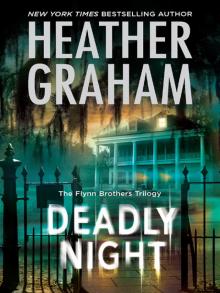 Deadly Night
Deadly Night The Uninvited
The Uninvited Dust to Dust
Dust to Dust Heart of Evil
Heart of Evil A Perfect Obsession
A Perfect Obsession The Keepers
The Keepers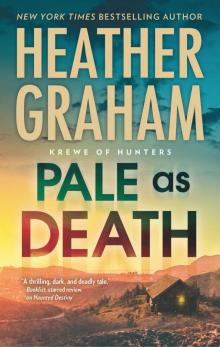 Pale as Death
Pale as Death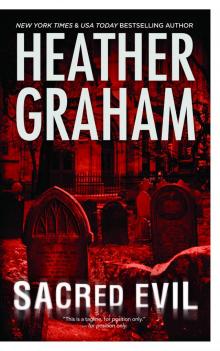 Phantom Evil
Phantom Evil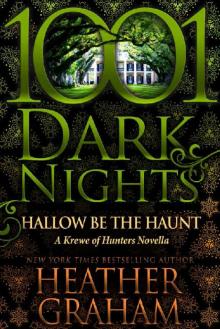 Hallow Be the Haunt
Hallow Be the Haunt Night of the Wolves
Night of the Wolves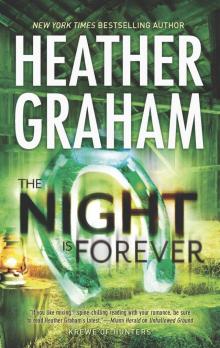 The Night Is Forever
The Night Is Forever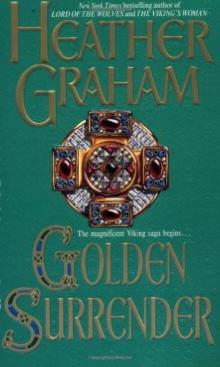 Golden Surrender
Golden Surrender Kiss of Darkness
Kiss of Darkness Beneath a Blood Red Moon
Beneath a Blood Red Moon A Dangerous Game
A Dangerous Game Ghost Shadow
Ghost Shadow Long, Lean, and Lethal
Long, Lean, and Lethal Fade to Black
Fade to Black The Rising
The Rising And One Wore Gray
And One Wore Gray Rebel
Rebel The Unseen
The Unseen The Night Is Watching
The Night Is Watching The Evil Inside
The Evil Inside The Unspoken
The Unspoken The Night Is Alive
The Night Is Alive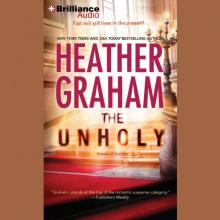 The Unholy
The Unholy Nightwalker
Nightwalker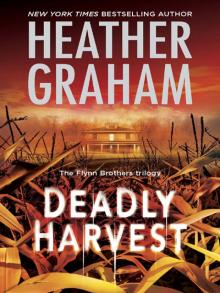 Deadly Harvest
Deadly Harvest An Angel for Christmas
An Angel for Christmas A Pirate's Pleasure
A Pirate's Pleasure American Drifter
American Drifter Realm of Shadows
Realm of Shadows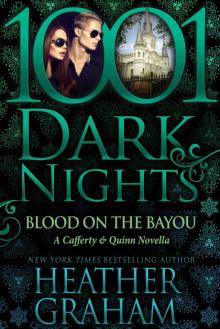 Blood on the Bayou
Blood on the Bayou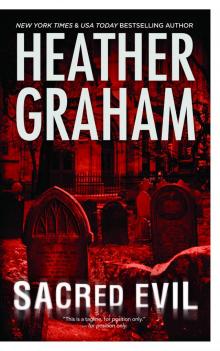 Sacred Evil
Sacred Evil Dying to Have Her
Dying to Have Her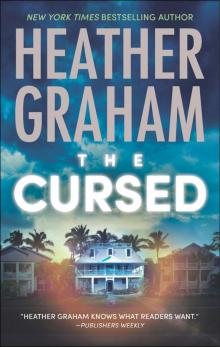 The Cursed
The Cursed Captive
Captive Hurricane Bay
Hurricane Bay Drop Dead Gorgeous
Drop Dead Gorgeous Ghost Memories
Ghost Memories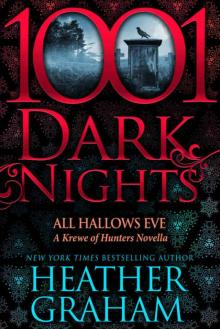 All Hallows Eve
All Hallows Eve Dying Breath
Dying Breath Deadly Fate
Deadly Fate The Dead Room
The Dead Room Lord of the Wolves
Lord of the Wolves Ghost Night
Ghost Night Ghost Walk
Ghost Walk The Forgotten
The Forgotten Unhallowed Ground
Unhallowed Ground One Wore Blue
One Wore Blue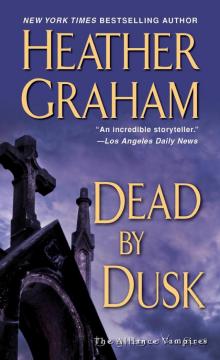 Dead By Dusk
Dead By Dusk Night of the Blackbird
Night of the Blackbird The Dead Play On
The Dead Play On Bride of the Night
Bride of the Night Wicked Deeds
Wicked Deeds The Forbidden
The Forbidden Triumph
Triumph Out of the Darkness
Out of the Darkness Love Not a Rebel
Love Not a Rebel The Last Noel
The Last Noel Tall, Dark, and Deadly
Tall, Dark, and Deadly The Death Dealer
The Death Dealer Dead on the Dance Floor
Dead on the Dance Floor Law and Disorder
Law and Disorder Dark Rites
Dark Rites New Year's Eve
New Year's Eve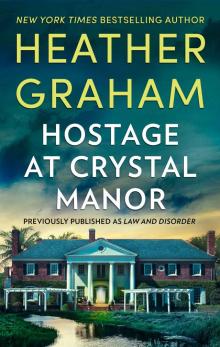 Hostage At Crystal Manor
Hostage At Crystal Manor And One Rode West
And One Rode West Home in Time for Christmas
Home in Time for Christmas Killing Kelly
Killing Kelly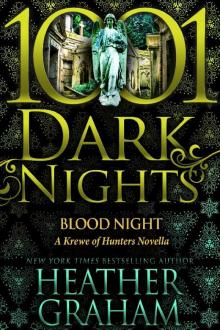 Blood Night
Blood Night Tangled Threat (Mills & Boon Heroes)
Tangled Threat (Mills & Boon Heroes)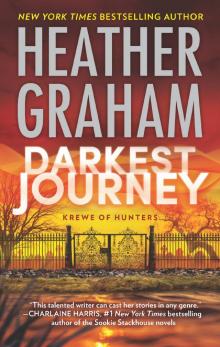 Darkest Journey
Darkest Journey Glory
Glory Deadly Touch
Deadly Touch An Unexpected Guest
An Unexpected Guest Night of the Vampires
Night of the Vampires Seize the Wind
Seize the Wind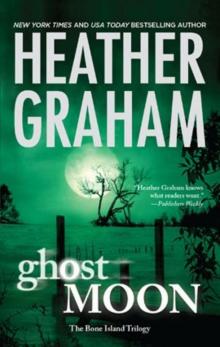 Ghost Moon
Ghost Moon The Vision
The Vision Dreaming Death
Dreaming Death Conspiracy to Murder
Conspiracy to Murder Horror-Ween (Krewe of Hunters)
Horror-Ween (Krewe of Hunters)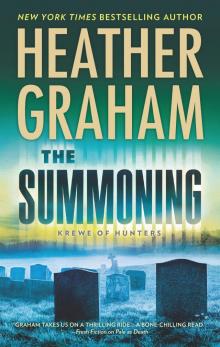 The Summoning
The Summoning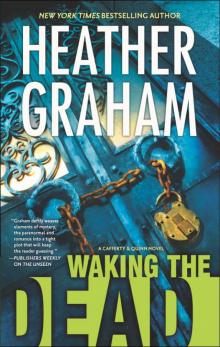 Waking the Dead
Waking the Dead Danger in Numbers
Danger in Numbers The Hidden
The Hidden Sweet Savage Eden
Sweet Savage Eden Tangled Threat ; Suspicious
Tangled Threat ; Suspicious Mother's Day, the Krewe, and a Really Big Dog
Mother's Day, the Krewe, and a Really Big Dog Picture Me Dead
Picture Me Dead The Killing Edge
The Killing Edge St. Patrick's Day
St. Patrick's Day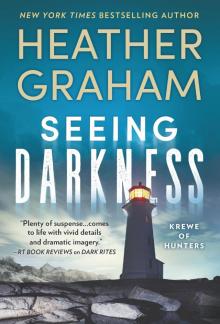 Seeing Darkness
Seeing Darkness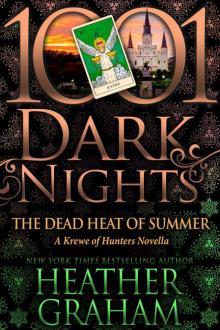 The Dead Heat of Summer: A Krewe of Hunters Novella
The Dead Heat of Summer: A Krewe of Hunters Novella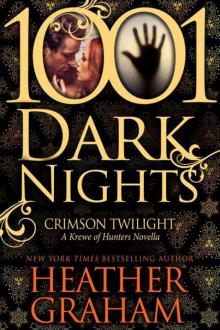 Crimson Twilight
Crimson Twilight Haunted Destiny
Haunted Destiny Devil's Mistress
Devil's Mistress Banshee
Banshee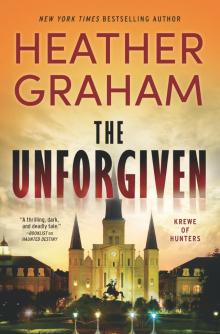 The Unforgiven
The Unforgiven The Final Deception
The Final Deception A Horribly Haunted Halloween
A Horribly Haunted Halloween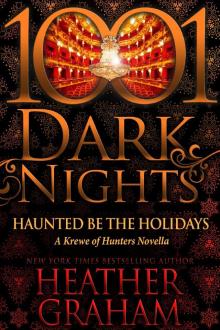 Haunted Be the Holidays
Haunted Be the Holidays Deadly Gift
Deadly Gift Easter, the Krewe and Another Large White Rabbit
Easter, the Krewe and Another Large White Rabbit Haunted
Haunted The Silenced
The Silenced Let the Dead Sleep
Let the Dead Sleep Christmas, the Krewe, and Kenneth
Christmas, the Krewe, and Kenneth Big Easy Evil
Big Easy Evil Sinister Intentions & Confiscated Conception
Sinister Intentions & Confiscated Conception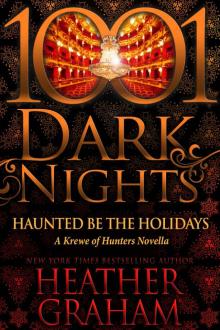 Haunted Be the Holidays: A Krewe of Hunters Novella
Haunted Be the Holidays: A Krewe of Hunters Novella Blood Red
Blood Red A Perilous Eden
A Perilous Eden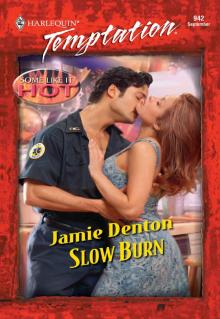 Slow Burn
Slow Burn Strangers In Paradise
Strangers In Paradise Bitter Reckoning
Bitter Reckoning Krewe of Hunters, Volume 1: Phantom Evil ; Heart of Evil ; Sacred Evil ; The Evil Inside
Krewe of Hunters, Volume 1: Phantom Evil ; Heart of Evil ; Sacred Evil ; The Evil Inside Do You Fear What I Fear?
Do You Fear What I Fear? The Face in the Window
The Face in the Window Krewe of Hunters, Volume 3: The Night Is WatchingThe Night Is AliveThe Night Is Forever
Krewe of Hunters, Volume 3: The Night Is WatchingThe Night Is AliveThe Night Is Forever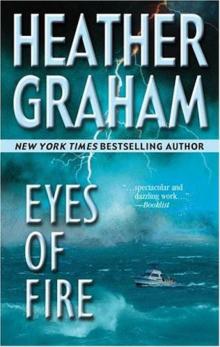 Eyes of Fire
Eyes of Fire Apache Summer sb-3
Apache Summer sb-3 Sensuous Angel
Sensuous Angel In the Dark
In the Dark Knight Triumphant
Knight Triumphant Hours to Cherish
Hours to Cherish Tender Deception
Tender Deception Keeper of the Dawn tkl-4
Keeper of the Dawn tkl-4 Apache Summer
Apache Summer Between Roc and a Hard Place
Between Roc and a Hard Place Echoes of Evil
Echoes of Evil The Game of Love
The Game of Love Sacred Evil (Krewe of Hunters)
Sacred Evil (Krewe of Hunters) Bougainvillea
Bougainvillea Tender Taming
Tender Taming Keeper of the Night (The Keepers: L.A.)
Keeper of the Night (The Keepers: L.A.) Lonesome Rider and Wilde Imaginings
Lonesome Rider and Wilde Imaginings Lucia in Love
Lucia in Love The Gatekeeper
The Gatekeeper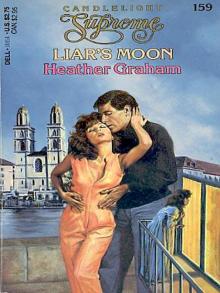 Liar's Moon
Liar's Moon Dark Rites--A Paranormal Romance Novel
Dark Rites--A Paranormal Romance Novel A Season for Love
A Season for Love Krewe of Hunters, Volume 6: Haunted Destiny ; Deadly Fate ; Darkest Journey
Krewe of Hunters, Volume 6: Haunted Destiny ; Deadly Fate ; Darkest Journey Keeper of the Dawn (The Keepers: L.A.)
Keeper of the Dawn (The Keepers: L.A.)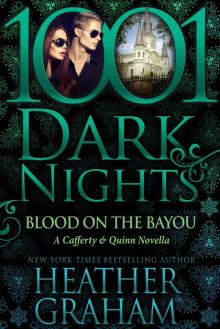 Blood on the Bayou: A Cafferty & Quinn Novella
Blood on the Bayou: A Cafferty & Quinn Novella Double Entendre
Double Entendre A Perfect Obsession--A Novel of Romantic Suspense
A Perfect Obsession--A Novel of Romantic Suspense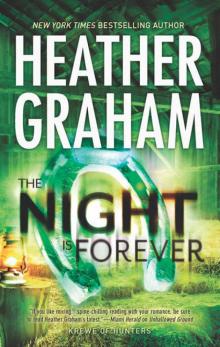 The Night Is Forever koh-11
The Night Is Forever koh-11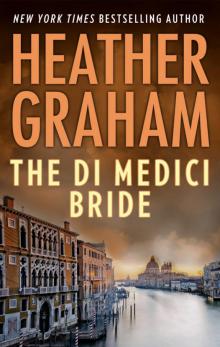 The Di Medici Bride
The Di Medici Bride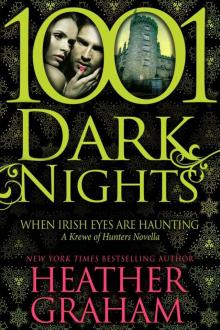 When Irish Eyes Are Haunting: A Krewe of Hunters Novella
When Irish Eyes Are Haunting: A Krewe of Hunters Novella The Keepers: Christmas in Salem: Do You Fear What I Fear?The Fright Before ChristmasUnholy NightStalking in a Winter Wonderland (Harlequin Nocturne)
The Keepers: Christmas in Salem: Do You Fear What I Fear?The Fright Before ChristmasUnholy NightStalking in a Winter Wonderland (Harlequin Nocturne) Never Fear
Never Fear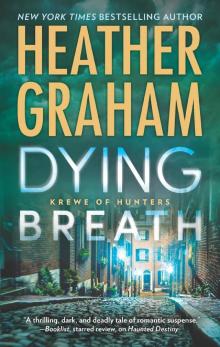 Dying Breath--A Heart-Stopping Novel of Paranormal Romantic Suspense
Dying Breath--A Heart-Stopping Novel of Paranormal Romantic Suspense If Looks Could Kill
If Looks Could Kill This Rough Magic
This Rough Magic Heather Graham's Christmas Treasures
Heather Graham's Christmas Treasures Hatfield and McCoy
Hatfield and McCoy The Trouble with Andrew
The Trouble with Andrew Never Fear - The Tarot: Do You Really Want To Know?
Never Fear - The Tarot: Do You Really Want To Know?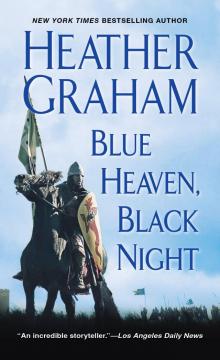 Blue Heaven, Black Night
Blue Heaven, Black Night Forbidden Fire
Forbidden Fire Come the Morning
Come the Morning Dark Stranger sb-4
Dark Stranger sb-4 Lie Down in Roses
Lie Down in Roses Red Midnight
Red Midnight Krewe of Hunters Series, Volume 5
Krewe of Hunters Series, Volume 5 Night, Sea, And Stars
Night, Sea, And Stars Snowfire
Snowfire Quiet Walks the Tiger
Quiet Walks the Tiger Mistress of Magic
Mistress of Magic For All of Her Life
For All of Her Life Runaway
Runaway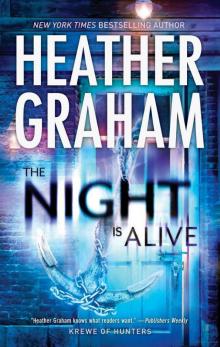 The Night Is Alive koh-10
The Night Is Alive koh-10 The Evil Inside (Krewe of Hunters)
The Evil Inside (Krewe of Hunters)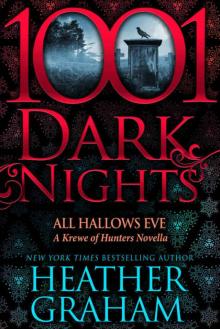 All Hallows Eve: A Krewe of Hunters Novella (1001 Dark Nights)
All Hallows Eve: A Krewe of Hunters Novella (1001 Dark Nights) Tomorrow the Glory
Tomorrow the Glory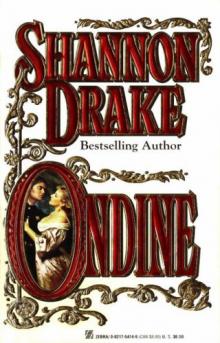 Ondine
Ondine Angel of Mercy & Standoff at Mustang Ridge
Angel of Mercy & Standoff at Mustang Ridge Bride of the Tiger
Bride of the Tiger When Next We Love
When Next We Love Heather Graham Krewe of Hunters Series, Volume 4
Heather Graham Krewe of Hunters Series, Volume 4 A Season of Miracles
A Season of Miracles Realm of Shadows (Vampire Alliance)
Realm of Shadows (Vampire Alliance) When We Touch
When We Touch Serena's Magic
Serena's Magic Rides a Hero sb-2
Rides a Hero sb-2 All in the Family
All in the Family Handful of Dreams
Handful of Dreams A Stranger in the Hamptons
A Stranger in the Hamptons Krewe of Hunters, Volume 2: The Unseen ; The Unholy ; The Unspoken ; The Uninvited
Krewe of Hunters, Volume 2: The Unseen ; The Unholy ; The Unspoken ; The Uninvited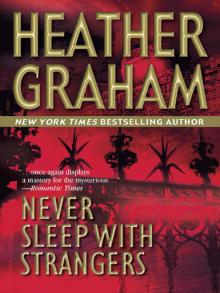 Never Sleep With Strangers
Never Sleep With Strangers Eden's Spell
Eden's Spell A Magical Christmas
A Magical Christmas Forever My Love
Forever My Love King of the Castle
King of the Castle Night Moves (60th Anniversary)
Night Moves (60th Anniversary) The Island
The Island Borrowed Angel
Borrowed Angel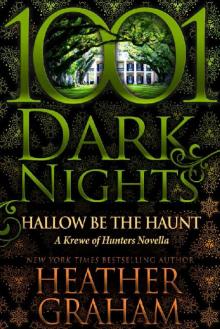 Hallow Be the Haunt: A Krewe of Hunters Novella
Hallow Be the Haunt: A Krewe of Hunters Novella Why I Love New Orleans
Why I Love New Orleans The Last Cavalier
The Last Cavalier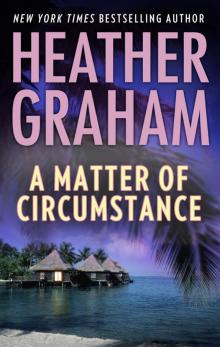 A Matter of Circumstance
A Matter of Circumstance Heather Graham's Haunted Treasures
Heather Graham's Haunted Treasures Tempestuous Eden
Tempestuous Eden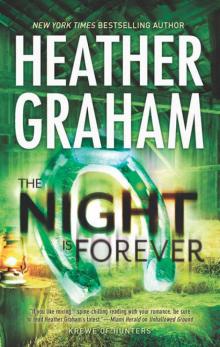 Krewe 11 - The Night Is Forever
Krewe 11 - The Night Is Forever